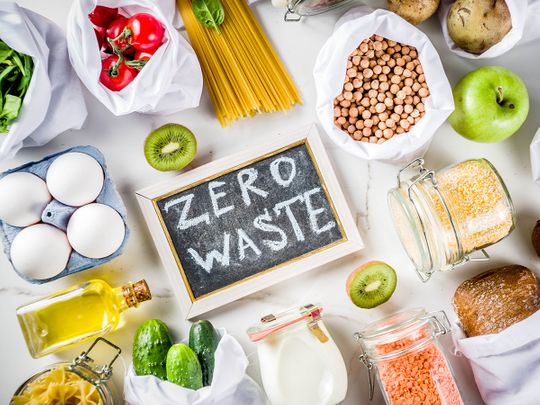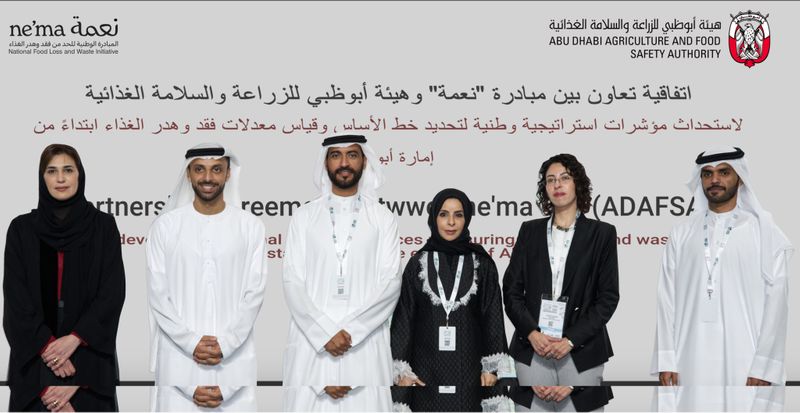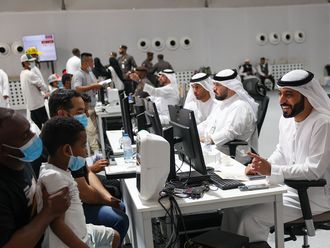
Abu Dhabi: Abu Dhabi will work to develop a national baseline that measures food waste and loss in the emirate, following an agreement between the Abu Dhabi Agriculture and Food Safety Authority (ADAFSA) and Ne’ma, the National Food Loss and Waste initiative in the UAE.
The agreement will support the UAE National Food Security Strategy’s goal to reduce food loss and waste by 50 per cent by 2030.
The agreement was signed on the sidelines of the Abu Dhabi International Food Exhibition by Saeed Al Bahri Al Ameri, ADAFSA director-general, and Ahmed Al Shamsi, CEO of Emirates Foundation, which administers the Ne’ma initiative.

What will be measured?
Through a collaborative approach, ADAFSA will work together with Ne’ma to establishing a food loss and waste baseline for Abu Dhabi, and set a quantified baseline. In particular, this project entails the development of a detailed overview of the food loss and waste including both volume and value across the food value chain. It also includes the primary areas for measurement of domestic food production, imports, food storage and logistics, food retail, hospitality, and households.
According to the agreement, surveys and interviews will be conducted on the food waste sector to obtain an accurate view on the level of food lost and wasted at the main stages of the supply chain, including the main causes of waste. The project will also identify areas for improvement, and conduct surveys and exclusive interviews tackling household food waste.
The goal is to form a granular view of what and where loss and waste occur across the value chain, what the root causes are, and understand the behavioural differences among the various segments of the population in Abu Dhabi, so that immediate and long-term improvements can be defined. This study will follow international standards and methodologies for food loss and waste measurements
read more
- UAE's new nutrition strategy and rules: All you need to know
- UAE food security trends indicate safe, nutritious and sufficient future produce for citizens
- UAE: Seamless imports of agricultural equipment to boost food security
- Sharjah Ruler launches 1,400-hectare wheat farm in Mleiha to boost food security
Community health
“We are delighted to collaborate with Ne’ma initiative, and we appreciate their efforts to reduce food loss and waste in the country. We strive together to achieve the goals of the agreement starting from the authority’s mission to control and inspect agricultural production inputs and food and agricultural materials imported or exported or produced in the country and circulated in the emirate, to ensure that the community obtains safe and healthy food,” said Dr Maryam Al Suwaidi, deputy director-general for operational affairs at ADAFSA.
“This agreement is in line with the authority’s mission, which was recently launched, and it states the importance of launching a national program that aims to reduce food loss and waste at the level of the Emirate of Abu Dhabi. This program works collaboratively with Ne’ma initiative in conducting a comprehensive assessment of the current situation, developing indices for measuring food loss and waste on a regular basis, and creating a legislative and legal system that supports all the initiatives that are related to the program. The program also aims to enhance the recycling and processing infrastructure and launch initiatives and awareness campaigns that achieve the shared vision of global leadership in food security,” she added.
“We strive through this agreement to develop a food loss and waste baseline in Abu Dhabi that identifies food loss and waste hotspots, reveal the extent of the challenge, and enable us to make informed and data-driven decisions and interventions and national reduction plan to achieve the strategic goal of Ne’ma,” said Khuloud Al Nuwais, chief sustainability officer at the Emirates Foundation and Ne’ma committee secretary general.
“This collaboration aided to fulfil the urgent need to collect primary data for obtaining a credible quantitative estimation that can be used as an indicator to reduce food waste by half by 2030,” she added.
Ne’ma aims to build a national umbrella and collaborative approach with government entities and private sector institutions across the food value chain that includes farms, distributors, retailers, hospitality sector, food services, and community members. This collaborative approach aims to develop the right solutions for reducing the food loss and waste that occurs during the processes of production, processing, distribution, consumption, and disposal.












